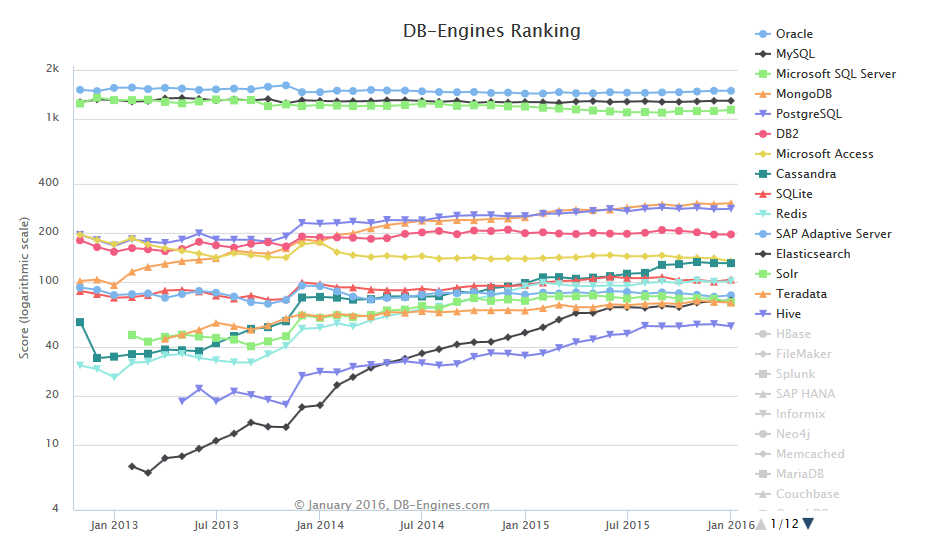| Oracle Is DBMS Of The Year |
| Written by Kay Ewbank | |||
| Monday, 18 January 2016 | |||
|
Oracle has come out on top in the database rankings for 2015. The ranking was carried out by DB-Engines, a knowledge base of relational and NoSQL database management systems that keeps tabs on nearly 300 products.
The ranking is based on a number of factors, including search engine mentions, Google Trends data, tweets on Twitter, job offers, LinkedIn profile matches, and mentions on coding sites. The popularity is worked out by considering the increase of popularity from one year to the next. One reason why Oracle may have come out highly is because DB-Engines uses the actual difference in numbers rather than the percentage increase. The reasoning is that DB-Engines feel percentage increases favor systems with a tiny popularity at the beginning of the year, but using the raw number would give systems with a larger market share such as Oracle an advantage. The team at DB-Engines explained in a blog post that: "Oracle is the clear leader in the DB-Engines Ranking since we started more than 3 years ago. Its ranking score saw some ups and downs in that period, but 2015 was an exceptionally good year for Oracle, gaining 56.9 scoring points." They go on to say that while Oracle was always very strong in ranking categories such as job offers and LinkledIn profiles, last year it was catching up in its relatively weaker categories such as discussions on coding sites and tweets.
MongoDB was the runner up having been the winner in 2014 and 2013. The document store came close to holding its winning position, as its ranking score went up by 55.1 points, only just behind Oracle. It also overtook PostgreSQL in absolute terms as the most widely mentioned NoSQL system. Cassandra came third, gained 32.2 scoring points in 2015. It also became the top ranking wide column store in absolute terms, coming in at position 8 in the overall ranking. The figures for absolute scoring as opposed to the increase in mentions shows that relational databases came in above the NoSQL products, unlike the positions for the previous two years. This year's top 10 are: Oracle The team at DB-Engines says that while NoSQL has fallen from the top place, this isn't the end of the NoSQL climb, with NoSQL systems led by MongoDB and Cassandra, along with other leading NoSQL systems such as Redis, Neo4j and Couchbase also having a very good year.
More InformationRelated ArticlesTo be informed about new articles on I Programmer, sign up for our weekly newsletter,subscribe to the RSS feed and follow us on, Twitter, Facebook, Google+ or Linkedin.
Comments
or email your comment to: comments@i-programmer.info |
|||
| Last Updated ( Monday, 18 January 2016 ) |



